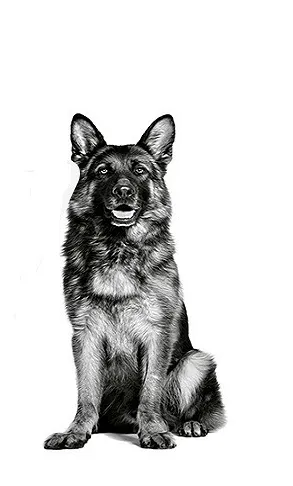German Shepherd
A dog breed which can literally put their life on the line for their owners, German Shepherd is one of the most favourite guard dogs in the world. Though they are aloof in their looks, they are lovely family companions.
Average sizes and life expectancy of the breed
varies
30-43 kg
9-13 years
Germany
pure
herding
Characteristics of the German Shepherd
One of the most ferocious dogs on the planet earth, German Shepherds are also absolute gems when it comes to being family companions. Although they are aloof, they are usually not aggressive and can be pretty easy going with house guests if properly socialised. But what makes them special is their strong protective instincts that makes them one of the best guard dogs around. Also, German Shepherds are highly intelligent which makes it easier for owners to teach them tricks and commands quickly.

Coat
The German Shepherd has a semi-long, well laid-back coat. Their colors can vary greatly from black with brown, golden, yellowish and grayish markings. A trademark of this breed consists of the black coat that covers the animal's back, as if it were a cape, so they are also known as Black Cape German Shepherd in Brazil. They shed a lot and throughout the year, so daily brushing is essential to remove dead hair. A vacuum cleaner around the house will also be very welcome. When it comes to shedding, German Shepherds do shed a lot especially during autumn season and "blows' their hair at least once. There is no magic solution to solve this problem apart from regular brushing. Also, if you bathe these dogs too much, it can strip of the natural oil off from their skin. So owners need not bath their German Shepherd unless it is really required.
Pet Profile
Recommended Treats for German Shepherd
Chip Chops Dental Roll Peanut Butter Wrapped with Real Chicken Dental Dog Treat 80 gm
Dental Treats

Rena Love Jerky Lamb and Smoke Flavor Dog Treats 120 gm
Jerky Treats

Brunos Wild Essentials Rosemary & Thyme Lamb Jerky Dog Treat 60g
Meaty Treats

Dogaholic Milky Chew Bone Style Treat for Dogs 15 pieces
Calcium And Milk Treats

Best Dog Food For German Shepherd
German Shepherds are dogs who needs a protein rich diet consisting of 18-22% protein. They can also derive nutrients from grains, fruits and vegetables. Yet, owners need to ensure that these dogs have the right balance of proteins, vitamins, minerals and fibre for optimal health. The amount of calories which German Shepherds consume depends completely upon their activity level and life stage. For newborn German Shepherd puppies, mother's milk is absolutely essential for getting their nutrients for proper growth. If by any chance mother's milk is not available, German Shepherds can be fed powdered milk every 2-3 hours of day or nearly 8 feedings a day. For puppies having an age between 2 months to 2 years, their diet should primarily consists of high protein and decent carbohydrate and fat content. This is because puppies exhibit high curiosity levels and hence they have a high energy requirement. For adults, they need a protein rich diet as they too lead an active lifestyle. Besides, their diet should contain Omega fatty acids for supporting excellent bone and joint function. As for Senior German Shepherd Dogs, it is advisable to feed them a diet having low protein and fat content as they are little exposed to obesity.
Grooming Your German Shepherd Dogs
German Shepherds are heavy shedders and possess a thick double coat that needs regular brushing and grooming. These dogs shed the most during the onset of winters as they develop new coats to stay warm. This is the time they need thorough care of their skin and coat. German Shepherd also needs a little amount of skin attention during which you will find an increased shedding and is called ‘blowing out’. They must be groomed twice weekly and have their coats raked during shedding season to eliminate tick and flea infestation. When it comes to bathing, these dog's doesn't need to bathed unlike other large breed dogs. This is mainly because they have double coat and washing them too often can lead to strip away the natural oils in their skin, which eventually will make their skin dull. Hence, they only need to bathed once every 3-4 months.
Taking Care of a German Shepherd
German Shepherds just want to please their humans and the best you can offer them is love. Of course, making your furry friend have a healthy life is part of this whole care. The German Shepherd, as its name implies, has its origins in herding, so it has to be always active and feel useful. Stimulating play is great for keeping your friend balanced. Looking for the ball, hiding objects and going for walks every day will make you very happy and tired in the right measure. However, if your dog has problems like the Coxofemoral Dysplasia that we talked about above, it's important not to strain his paws. Try to find out with your veterinarian which are the most suitable physical activities for each degree of the disease. A high-quality and balanced diet will ensure that your dog does not gain weight and that his hair is always firm and shiny. In addition, regular tooth brushing is essential to prevent the appearance of bacterial plaque (tartar).
History of German Shepherds
As the name implies, the German Shepherd breed originates from Germany and the predecessors of this breed date back to the 12th century. Starting in the 19th century, a cavalry officer named Max von Stephantiz decided to use his retirement to create a uniform and excellent breed. Its objective was to bring together all the best characteristics of the existing sheepdogs from the different regions of Germany in order to arrive at a perfect breed. His goal was achieved with praise and today the German Shepherd is one of the best known and appreciated breeds in the world!